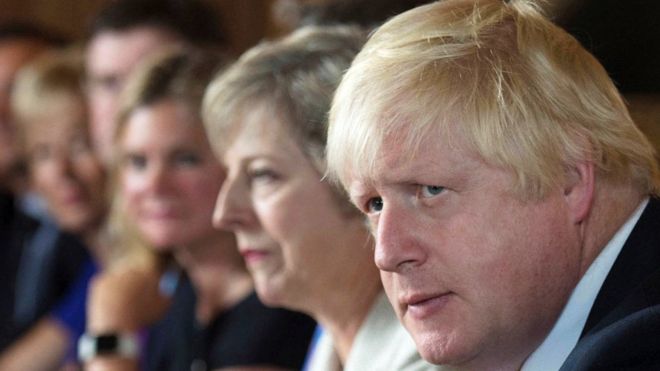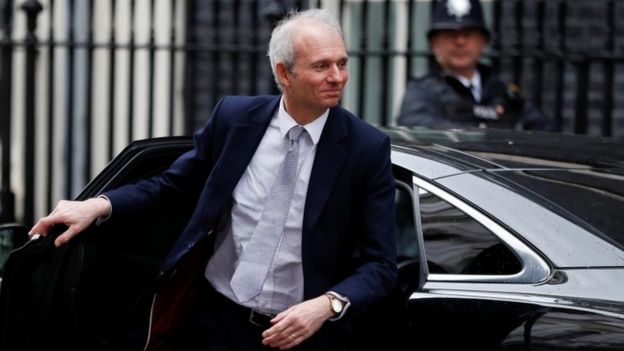10 February 2020
 REUTERS
REUTERS
Jeremy Hunt said Mrs May made a "deliberate decision" to sideline the then Foreign Secretary Mr Johnson.
Talks were instead entrusted to the new Department for Exiting the European Union (DExEU).
The decision to found the department was branded a "mistake" by Mr Hunt's cabinet colleague David Lidington.
The comments, made by Mr Hunt and Mr Lidington in interviews with the Institute for Government (IfG) think tank, hint at Theresa May's thinking in the crucial months after the UK voted to leave the EU.
Asked if the Foreign Office had been sidelined during the Brexit negotiations, Mr Hunt said: "It was a deliberate decision to take Brexit out of the hands of the Foreign Office while Boris was foreign secretary, that was what Number 10 intended.
"When I became foreign secretary, we got a bit more involved."
On becoming prime minister, Mrs May founded DExEU and handed over responsibility for negotiations to the new secretary of state, David Davis.
Both Mr Davis and Mr Johnson resigned from Mrs May's cabinet in July 2018 after she presented them with her so-called 'Chequers plan' to keep the UK closely aligned to EU goods regulations.
 REUTERS
REUTERS'A mistake'
Speaking to the IfG, the former de-facto deputy prime minister David Lidington said: "I think that, as is now recognised, it was a mistake to create DExEU as a separate department.
"The fact that you had then DExEU try to do things and Number 10 and the Cabinet Office trying to do things as well…trying to knit that together just took more energy and time and resource than should have been necessary.
"In my ideal world, I would not have invented DExEU as a department. I would have had a big unit, but I would have located it as an annex to the Cabinet Office and Number 10, because the prime minister was going to be driving the negotiations."
'The final leap'
Cross-party talks on Brexit in the spring of 2019 came "pretty close" to succeeding, Mr Lidington also suggested.
Having failed to pass her Brexit deal on three occasions and facing significant opposition from within her party, Mrs May invited opposition ministers to talks to try to find a compromise solution that would have broad support.
The talks collapsed on 17 May 2019, with the Labour Party leader Jeremy Corbyn saying the government had "not fundamentally shifted its view".
The discussions foundered on the issues of customs and a second referendum, according to Mr Lidington.
Labour demanded a customs union with the EU and a default referendum on Brexit, which the government was not willing to concede.
"There was an unwillingness on both sides to make the final leap," Mr Lidington said of the talks.
- May: I had to approach Labour over Brexit
- Labour-Tory Brexit talks end without deal
- Government to shut Brexit department on 31 January
He also intimated that Mrs May should have reached out to opposition leaders when she became prime minister in 2016 to build consensus.
"There should have been a different approach to the negotiations at the start," said Mr Lidington.
"And possibly an attempt to reach out to other parties early on, saying: 'This is a national decision, we have had a vote in the referendum, now we need to move forward together'."
Reflecting on Mrs May's decision to take a hard line in the Brexit negotiations, Mr Lidington added: "I think probably she felt that, having supported Remain, that she had to demonstrate her credentials as committed to delivering the referendum result."
https://www.bbc.com/news/uk-politics-51445941